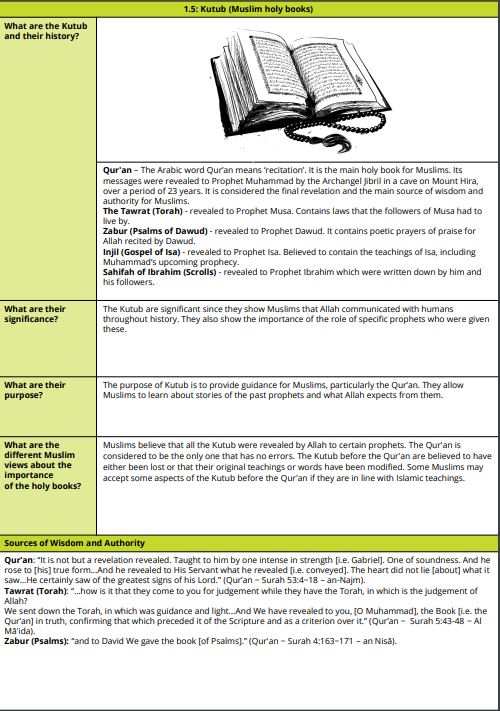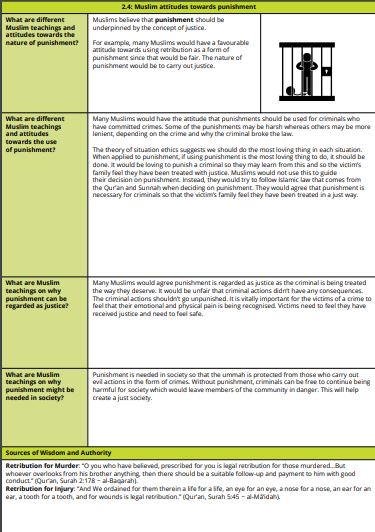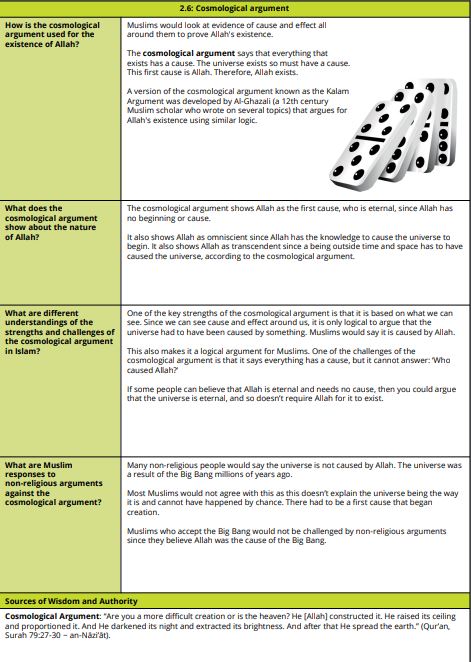March 2024 Religious Studies subject update
Welcome to your Pearson Edexcel Religious Studies March 2024 subject update!
I hope you are well and I'm sure you are no doubt ready for the upcoming break!
We have lots of exciting updates and resources to share with you, including GCSE exemplar answers and content support resources for those teaching Islam on Specification B. I hope you find them useful!
I'm also delighted to be able to tell you about our brand NEW entry level certificate qualification available to support our Specification A centres.
As always, please do get in touch with me if you have any queries or I can help with anything.
Best wishes,
Susan Currey
Religious Studies Subject Advisor
If you have any questions, then please do contact me:
☎ Call: 0344 463 2535
✉ Email: TeachingReligiousStudies@pearson.com
💻 Book a Teams meeting with me: https://bit.ly/3rEVLx8
This update includes:
| UK GCSE (A&B) |
|---|
| International GCSE |
|---|
| AS & A Level |
|---|
| Enrichment and T&L support |
|---|
New Entry Level Certificate in Religious Studies
We’ve listened to your feedback and after working with a range of key stakeholders, we are delighted to be able to introduce our new Entry Level Certificate in Religious Studies. This complements Pearson Edexcel’s GCSE Specification A qualification, when Catholic Christianity and Judaism are chosen as the two religions for study (with a 75:25 split).
This qualification has been designed to ensure that students working below Grade 1 at GCSE have an alternative qualification to adequately reward their studies. This is in line with Pearson's pledge to "ensure all learners and educators feel included in education“, so that all learners have the opportunity to succeed.
This ELC can be used as a progression course prior to GCSE, or students could be entered for both the ELC and the GCSE, or this could be offered as an alternative to our GCSE qualification.
First teaching September 2024
First assessment Summer 2025
-
To find out more about our new ELC qualification
This news update includes further details about our NEW entry level certificate qualification.

We are running an online event designed for teachers wanting to find out more about this qualification:
| Date | Time | Booking Link |
|---|---|---|
17th April 2024 |
16:30 - 18:00 | Booking Link |
To support teachers understand the amended level descriptors, we have published a series of exemplar answers, across the level and mark range.
This month includes, answers across:
- Islam
- Judaism
Please note that as these use exam questions from the 2023 series, you will need your Edexcel Online login to access these.
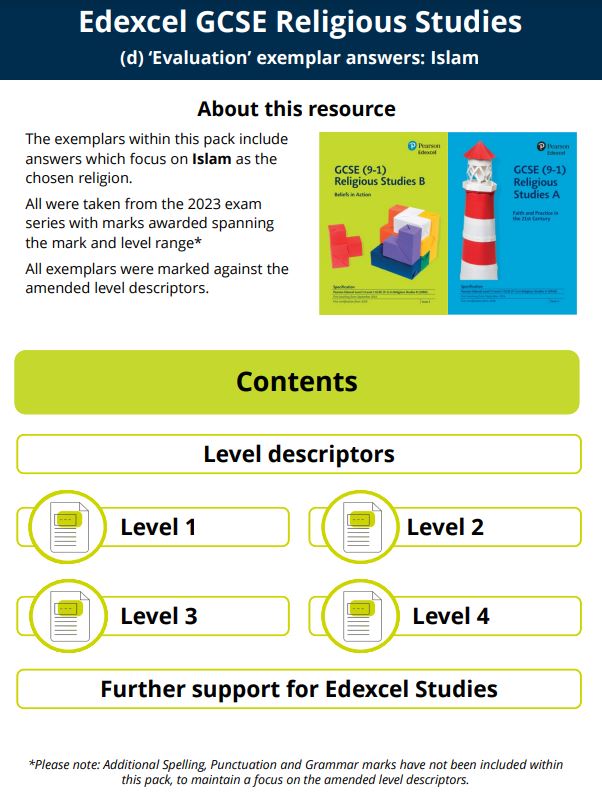
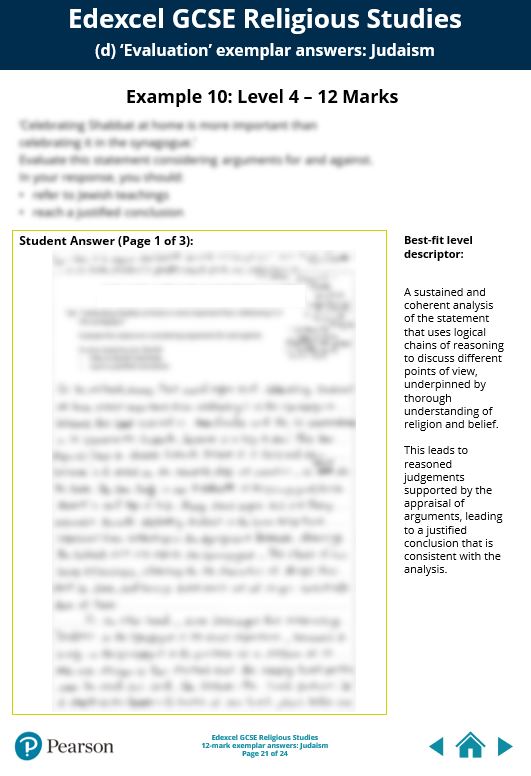
As part of our commitment to helping teachers understanding the content within our GCSE specifications, we have released a series of resources to support teaching Islam across Papers 1C, 2C, 3C.
You will need your Edexcel Online login to access these resources.
examWizard
'examWizard' is a free exam preparation tool containing a bank of past Edexcel exam questions, mark schemes and examiners' reports for a range of GCSE, GCE, Functional Skills subjects & BTEC sectors.
It allows you to select and build your own mock exams with access to past exam questions across series.

-
Find out more about examWizard
To find out more about the benefits of exam wizard and how to use this useful tool.

On Monday 18th March, we ran an online event to support teachers with using this tool.
Slides from the event can be accessed at the link below:
We are now offering a mock marking and moderation service for GCSE Religious Studies.
The Pearson Edexcel Mocks Service can help your students gain vital insight into the examination process, while saving you valuable time. These services will be using the amended level descriptors to give you the opportunity to see how questions perform under the new criteria.
These services are currently available to order now for the following most popular papers:
Specification A: Paper 1A, Paper 2F, Paper 3A
Specification B: Paper 1B, Paper 2C
*You can request other papers on an ad-hoc basis
What is the Mocks Service?
The Mocks Service for GCSE Religious Studies helps you to achieve consistency in marking across groups of schools, departments and cohorts. Students sit exam papers. The papers are marked by Edexcel senior examiners applying the new level descriptors and the results are uploaded to ResultsPlus for detailed question level analysis.
It is designed to be flexible for your needs:
- Submit entries for the whole qualification or only entries for one paper
- Submit your whole cohort, cohorts across the Trust, a sample, or as few as 5 papers
What is the Moderation Service?
Our moderation service helps support teacher understanding of the Pearson Edexcel mark scheme and provide confidence that marking is consistent across schools, departments and cohorts. Our moderators supply commentaries and reports to help identify areas that need improvement and that could benefit from additional CPD.
We recommend you submit a sample of around 15% of your own marked papers which will be reviewed by our team of Pearson Edexcel moderators. Within 21 days of us receiving your papers, we will provide personalised script commentaries and a detailed moderation report outlining trends and gaps in marking and feedback on student responses.
-
Mock Marking service
This link takes you to the mock marking webpage
-
How does the Mock service work?
This PDF gives an step-by-step explanation of the mock marking service process

The International GCSE Religious Studies team at Pearson Edexcel would like to hear your views about our current International GCSE Religious Studies qualification.
As part of our improvements work, we will be meeting with a series of stakeholders to understand their views on the current specification and assessment.
If you'd like to have your voice heard and would be willing to have a short 15-minute Teams to discuss your views, please complete the following form:
-
International GCSE Religious Studies Teacher Feedback meeting
If you would be willing to share your thoughts with us in a short 15-minute Teams meeting, please complete the above form

Please note that as part of this research, we will not collecting any personal information. We will only use the information you provide in connection to this piece of research, and we will not publish or share this information with any third party.
30-mark 'Evaluate' questions video
A guidance video is now available which explores how to approach 30-mark 'Evaluate' questions at A level Religious Studies. This looks at example answers across our papers achieving a range of different marks and levels.

-
Link to example answers and slides
To access the example answers discussed within this video or the slides

Every month, we release an edition of 'Topic of the Month' with the aim of supporting cultural capital and stimulating discussion within the classroom.
Each edition ties a current news event to our qualification content and enables students to see the bigger picture of what they are learning and how it relates to the world around them. Each edition includes a link to an article alongside some key discussion questions to encourage thought around the subject.
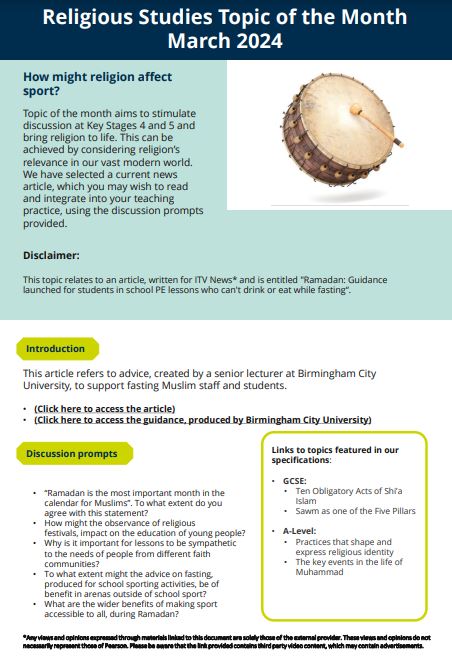
Every year, NATRE run a 'Spirited Arts' competition. The competition runs from the beginning of the school year to 31 July 2024. These can be in any art form and respond to one of the following themes:
1. Faith in humanity: “No to racism, yes to respect”
RE contributes to anti-racist education by teaching pupils about the wisdom of faiths and worldviews on human equality and by challenging negative attitudes. We are all different, and all religions are different – but are we all the same too? What holds humanity together? Is it faith? Hope? Love? Music? Sport? What threatens to tear us apart – racism, hatred, bigotry? How can we conquer the forces of division? You should use specific ideas and quotes from religions and worldviews. Make a work of art that shows what unites us, brings us together, joins humans as one people and expresses our harmony. Think carefully about how racism can be reduced and conquered for a better human race.
2. Looking Beyond
Challenge your pupils to create a piece of art that shows something they have learned in RE that surprised them and made them see the world, and life, in a fresh way. This theme invites pupils to stretch their vision beyond their own horizon and look at the world in a new way. RE encourages dialogue between different worldviews, and a great stimulus for this theme is a visit to an unfamiliar place of worship or a visit that enables an encounter with a new worldview. We think this will not be the most popular theme – is it harder than the others? – but it will produce really insightful work.
3. How do we envisage God?
This category unveils a thrilling opportunity for young minds to set sail on a creative journey, exploring the endless ways through which people from different faiths/worldviews and cultures perceive and connect with God. The term 'envisage' here embraces a rich tapestry of expressions, viewpoints, and encounters that shape peoples understanding of God from various worldviews. Atheists, agnostics and theistic pupils can all respond to this theme.
Pupils might consider the following questions as part of their work, either from their own point of view and experiences, or by reflecting on what they have learned about and from religion/worldviews in their RE lessons. Where is God? Who is God to you? Where might you/people of faith feel closest to God? When might you/people of faith seek God? Pupils may make references to prayer, places of worship, sacred texts, nature, spirituality, community, specific religious and non-religious worldviews amongst many other things. Older pupils might consider; How do the different ways we envisage , encounter, or consider (or don't consider) God connect us?
We invite pupils to channel their creativity and express their spirituality, all while embracing values of diversity and inclusion. From art and photography to poetry, short stories, music, and videos, this category warmly welcomes a range of artistic forms. The core essence of the theme lies in celebrating the diverse and unique ways in which individuals interpret and engage with God.
Some schools who have built Spirited Arts into their scheme/units of work as ‘Where is God?’ will find this theme a good match.
The theme is generously sponsored by The Church of England's Racial Justice Unit.
4. Wise Words? Holy Words?
Sources of wisdom in scripture are highly valued by billions: The Bible and the Quran are the world’s most popular books. But what do the pupils think is wise? Song lyrics? Proverbs? Gospels? Hadith? And how do wise words translate into beautiful art? This theme encourages pupils to take some wise words they have chosen themselves, including some from different religions perhaps, and reflect on the words and the wisdom in their art. The question marks in the title encourage pupils to think about what makes these words wise or – for some – holy. We like the idea that calligraphy as an art form will work for some pupils here and that a focus on sacred text in examination work will bring in entries from older pupils. The British Library website’s ‘SACRED’ section is a great resource.
5. Green faith, green future? [‘God’s good earth’]
Many religions thank God for nature, from Aardvarks to Zebras, via cats, elephants and rabbits. But the climate crisis deepens. Are we spoiling God’s good earth? Can we save it - and ourselves - in time of the threats of climate change? In this theme, learners are invited to explore ideas and beliefs about the natural world, animals and the environment, human responsibility for the earth and ways of praying about climate justice. Great work will show some originality: the globe in God’s hands won’t win! Challenge pupils to use scripture quotations thoughtfully and scientific enquiry and moral study methods to develop deep answers and good writing to go with stunning images.
6. Why do Animals Matter?
This theme invites creativity and critical thinking around the important issue of how we humans value and act towards other animals. Use of religious stories, texts and ideas is strongly encouraged! Religions and ethical belief systems promote kindness and compassion, and call upon people to actively avoid doing harm… the Golden Rule demands that we treat others how we would wish to be treated. But do these moral codes extend to animals as well as other humans? Can they? Should they? Do some animals matter more than others? Engaging with this theme will encourage a search for wisdom in texts, stories, traditions and practices from the world's religions and philosophies. Students will reflect and think with care about humanity's relationship with the other animals who share the earth with us. Younger children may express the spirituality of their love for animals. Older students may grapple with diverse opinions on animal welfare and rights.
-
NATRE Spirited Arts competition
Find out more information from the NATRE website.

Humanism UK have a range of resources which support a number of key topics taught within Religious Studies. You can access these at the following link:
-
Understanding Humanism UK resources
Access a range of Humanist UK resources

The Department of Philosophy, Ethics and Religion are running a range of April A level revision sessions to support studente revising for A level Religious Studies. There will be three distinct sessions running each day from 02/04/2024 - 11/04/2024 looking at a range of topics each day.
These are available free of charge and accessible using Zoom.
Session 1: A level Buddhism (11:00) including topics such as The Heart Sutra, Zen Buddhism, Buddhism in the West, Tibetan Buddhism, The Historical Buddha, The Three Lakshanas, The Eightfold Path, and Meditation.
Session 2: Philosophy of Religion (12:30) including topics such as Religious Language: Symbolism, Freud on Religious Belief, Religious Language: Wittgenstein, The Problem of Evil, The Design Argument, The Ontological Argument, The Cosmological Argument, and William James on Religious Experience.
Session 3: Ethics (14:00) including Meta-ethical approaches like Naturalism and Intuitionism, Free Will and Determinism, Aquinas on the Conscience, Natural Law, Situation Ethics, Utilitarianism, and Euthanasia.
-
University of Bangor A level revision sessions
To find out more information about these revision sessions.
-
Booking link
You can book on to these sessions here

I hope you found this update useful.
Please get in touch with me if you have any questions!
Subject advisor
Jenna Wyatt
Religious Studies


